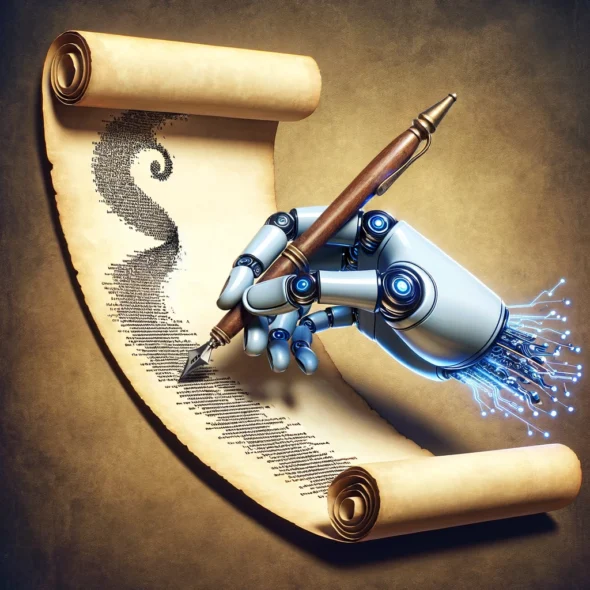By Jake Van Clief
Imagine this: a doctoral dissertation, written entirely by artificial intelligence, lands on the desk of an unsuspecting academic review board. As they pore over the pages, marveling at the depth and clarity of the work, they have no inkling that the author is not human.
If this AI-generated thesis can meet or exceed the most stringent standards of academia, it forces us to confront some uncomfortable questions. What does it say about our criteria for awarding the loftiest academic degrees? Does it expose inherent weaknesses in the way we evaluate scholarly merit? If a machine can navigate the complex requirements of a Ph.D., does it mean our intellectual benchmarks need a serious overhaul?
These are not hypotheticals. With the breakneck pace of AI development, this scenario is not just plausible, but probable. The AI models I’ve worked with in my own research are not just capable of stringing together coherent sentences. They offer genuine insights, make compelling arguments, and even venture into the realm of original thought.

I’ve seen it firsthand. In a recent paper of mine, published in the Saints Academic Review, I leaned heavily on AI assistance. And the peer-review board had no objections. In fact, they praised the thoroughness and clarity of the work. You can see for yourself – I’ve made the pre-print available online.
But I want to be clear: this is not about taking shortcuts or diminishing the value of human effort. Far from it. Crafting prompts for AI that yield meaningful results is an intellectual challenge in its own right. It requires a deep understanding of the subject matter, an ability to ask probing questions, and the wisdom to guide the AI down fruitful paths. In many ways, the human behind the machine is more important than ever.
So when skeptics dismiss AI writing as simplistic or unreliable, I have to push back. The most impressive AI-generated academic works I’ve seen are not the product of casual prompts or random inputs. They arise from carefully considered, highly specific queries that only a subject matter expert could devise. The AI is a tool, but it’s wielded with human mastery.

I understand the knee-jerk fear that AI might devalue hard-earned degrees and decades of scholarly tradition. But I believe this concern, while understandable, is misplaced. It springs from a very human impulse – the desire to defend one’s turf, to preserve the prestige of one’s achievements in the face of a perceived threat.
But is AI a threat to academic integrity, or an opportunity to expand the frontiers of knowledge? I firmly believe it’s the latter. Just as the printing press revolutionized the dissemination of ideas, and digital databases made vast troves of information instantly accessible, AI has the potential to be a transformative tool for researchers.
Of course, as with any powerful technology, there are pitfalls to avoid and ethics to consider. That’s why I devote much of my time to teaching responsible, thoughtful use of AI in academic settings. But the solution is not to reject the technology outright. It’s to develop the wisdom and guidelines to harness its potential for good.

Let’s return to our thought experiment. Imagine an AI-written dissertation that doesn’t just pass muster, but impresses the review board with its brilliance. Would we say the degree is unearned because the insights came from silicon rather than grey matter? I don’t think so. The value of a scholarly work lies in the ideas themselves, not the origins of those ideas.
Or suppose the opposite: the AI-generated thesis falls far short of the mark, requiring extensive human revision to meet academic standards. This too tells us something important. It suggests that, for all its power and potential, AI is still a tool. It can assist, but not replace, the human intellect. It is the sculptor, not the sculpture.
As we stand on the cusp of an AI revolution in academia, we have a choice. We can cling to tradition for tradition’s sake, or we can embrace the possibilities of a new era. Yes, there will be challenges. Yes, there will be a learning curve. But imagine what we stand to gain: a world where the pace of discovery is not constrained by the limits of any one human mind, where scholars can tackle more complex questions, unearth deeper insights, and expand the boundaries of knowledge itself.
So let’s not shrink from this frontier. Let’s approach it with both enthusiasm and caution, with boldness and wisdom. AI is coming to academia, whether we like it or not. I say we welcome it, shape it, and see just how far it can take us. The future of scholarship is being written as we speak – and it may just be an artificial intelligence that holds the pen.
Jake Van Clief is a senior at Flagler College studying Political Science with minors in International Studies and Religion, focusing on future governance and technology. He served in the U.S. Marine Corps as an Avionics and Cryptographic Technician, gaining extensive experience in various aircraft systems and cryptography. Through his company, Van Clief Media, he collaborates with a creative team to develop media using AI, art, writing, and programming. Jake is currently working on Eduba, a group chat and document creation platform for academics, while also applying to the University of Edinburgh to pursue a career as a political analyst and consultant in technology governance



Be the first to comment on "AI in academia: redefining the future of education"